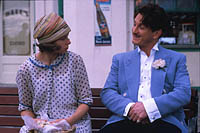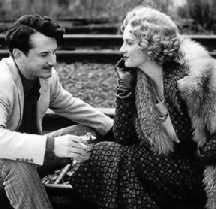Sweet and Lowdown (1999)

[reviews] [articles]
For better or for worse, Woody Allen has finally made a film that doesn't always feel like a Woody Allen film. Though many of Allen's trademarks appear (music, one-liners, sight gags), without the presence of the nebbish, Woody-like protagonist, Sweet and Lowdown is both an enjoyable film for Woody's fans, and a great film for those who claim not to like his pictures.
Structured in an almost docu-drama manner (a la Zelig), Sweet and Lowdown tells us the fictional story of Emmett Ray, the second greatest guitar player in the world. While Ray is able to make absolutely sublime music on stage, his persona and life off stage are decidedly unlikable. Allen examines, though not too seriously, the question of whether the artist is allowed to be a jerk in real life, if he is able to produce beautiful works or art. Surprisingly, the answer in Sweet and Lowdown would seem to be a definite "no". Sean Penn, playing the fictional character, is amazing; he is able to capture the spirit and nuance of his character in such a way that he completely makes it his own. What critics have been saying is true, Penn carries this picture. His Emmett Ray is a kleptomaniac, a sometimes pimp, a verbally abusive boyfriend, an even worse husband, a drunk, and an outstanding guitar player. Penn took lessons from arranger Dick Hyman for over six months to be able to admirably "fake" the guitar playing scenes, and it definitely works to the pictures benefit. The music itself is outstanding, and at times threatens to overtake the entire film, but Allen wisely allows its place alongside the film, delicately balancing the jazz scenes with the main narrative focus.
From several jazz experts (including an appearance by Allen as himself), we gradually learn the story of Ray and his legendary career. He was an outstanding musician, but only when he showed up (and he usually showed up drunk or not at all). We see his relationship with Hattie (Samantha Morton), a mute woman who captures his heart, though he refuses to admit to this. Morton does an overwhelming job in the picture, capturing the entire range of emotions Hattie undergoes without uttering a single sound. Her performance definitely deserves the Oscar buzz it's been garnering. In sharp contrast to Hattie is the talkative, sophisticated, over-analytical woman (Uma Thurman) who Ray impulsively marries. The marriage is a disaster and Ray's life continues to spiral out of control, while he continues to make wonderful music.
Though there are several wonderful running jokes (second greatest guitar player in the world, Ray's fascination with shooting live rats down at the dump), the film never achieves the timeless feel of such Allen classics of the past. In spirit it is much closer to Radio Days and Broadway Danny Rose than to more "sophisticated" Allen works like Hannah and Her Sisters. But as I mentioned earlier, it feels the more unlike a Woody Allen film than any previous comedy of his to date. It's refreshing in a way, especially for those critics who have been attacking the narcissistic cynicism they claim has been running through his last two films, and it's also enjoyable. Sweet and Lowdown never sets out to be a virtuoso work of film, it is content to merely be entertaining and engaging. Because of the sharp writing and the great performances of both Penn and Morton, it almost always is.
Release Date: December 3, 1999
Domestic Total Gross: $4,197,015
Distributor: Sony Classics

Back to the Woody Allen filmography